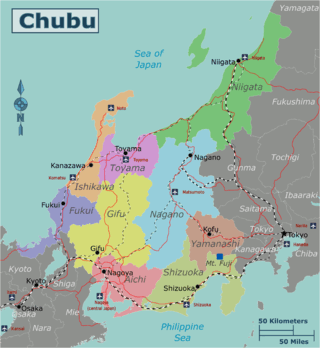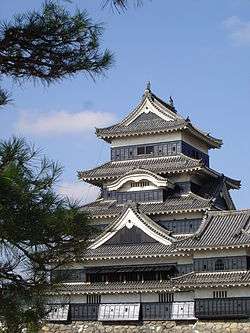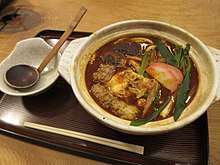Chubu
Chūbu (中部) is the central region of Japan's Honshu island.
This area is located at the border between West Japan and East Japan, there are many high-altitude mountains such as Mount Fuji and the Japanese Alps.
Food culture is different for each region.
Understand
Chubu means "middle region", accurately reflecting its position straddling the two Japanese poles of Kansai and Kanto. Often ignored by foreign tourists, many of Chubu's best attractions are in the mountains, particularly Mount Fuji and the Japanese Alps.
Prefectures
The Chūbu region covers a large and geographically diverse area of Honshū which leads to it generally being divided into three distinct subregions: Tōkai, Kōshin'etsu, and Hokuriku.
Tōkai(東海)
Located the southern Pacific coast.

| Aichi mostly urban sprawl around Nagoya |
| Gifu home to the northern Japan Alps and many hot springs |
| Shizuoka - home to the famous Mount Fuji and the scenic Izu Peninsula |
Hokuriku(北陸)
Located northwest of the Chubu region.
Kōshin'etsu(甲信越)
Located east of the Chubu region.
| Niigata famous for Koshihikari rice and sake |
| Nagano Prefecture famous for its winter skiing, the Olympics, and Matsumoto Castle |
| Yamanashi at the foothills of Mount Fuji |
Cities
- 🌍 Hida-Takayama - attractively preserved town and a good starting point for trips to the Japan Alps
- 🌍 Inuyama
- 🌍 Matsumoto
- 🌍 Kanazawa - stylish historic city
- 🌍 Nagano - Japan's winter sports capital
- 🌍 Nagoya - Chubu's largest city by far
- 🌍 Niigata - Major port city on the northern coast
- 🌍 Shizuoka
- 🌍 Toyama
Other destinations
- 🌍 Gero Onsen - one of Japan's Three Famous Hot Springs
- 🌍 Japan Alps - the largest and tallest mountain chain in Japan
- 🌍 Mount Fuji - the world's most photographed mountain with great views from the Fuji Five Lakes
- Oku-Hida Onsen Villages - 5 remote hamlets full of stunning scenery and some of Japan's best hot springs
- 🌍 Ono - historic castle town in Fukui prefecture
- 🌍 Sado Island - place of exile home to gold mines and the yearly Earth Celebration
- 🌍 Shirakawa-go - a well-preserved historic village and World Heritage Site
- 🌍 Sekigahara - the site of the famous battle that ushered in the Tokugawa Shogunate
- 🌍 Yuzawa - popular ski and hot spring resort, the setting of Yasunari Kawabata's Nobel Prize-winning Snow Country
Talk
There are many people who speak in each dialect in this area. For example, some Niigata people use ra instead of standard copula da such as ~raro instead of ~daro ("isn't it?"). Shizuoka people use ~dara instead of ~daro. In Ishikawa and Toyama, people use dara as an abuse word meaning "idiot".
Get in
By plane
Chubu Centrair International Airport, Japan's third major international gateway, is located on an artificial island 30 minutes south from Nagoya. Most larger cities around the region have airports, but they generally only serve domestic flights.
By train
True to the name, the Tokaido Shinkansen bisects the southern Tokai region, connecting to Tokyo in the east and Osaka and Kyoto in the west. Northern parts, Nagano, Toyama and Kanazawa, can be reached from Tokyo by the Hokuriku Shinkansen. The Hokuriku region is accessible from Kansai via the Thunderbird.
Get around
See
World Heritage Sites
- Nirayama Reverberatory Furnace - Part of the Sites of Japan’s Meiji Industrial Revolution: Iron and Steel, Shipbuilding and Coal Mining, Izunokuni
- Shirakawa-go and Gokayama - old farmouses that have been preserved, Shirakawa-go is the largest of the villages. Gokayama actually consists of two separate villages, Ainokura and Suganuma in Nanto, Toyama
- Mount Fuji While the mountain itself is included, the site is actually registered as a "cultural" listing consisting of more than 20 sites, including each of the Sengen Shrines around the mountain.
Castles

Original Castles
The Chubu region is home to 3 of the 12 original castles remaining in the country.
Reconstructed Castles
Gardens
- Kenrokuen Garden - One of the official Top 3 gardens in the nation, it has been a favorite for decades. (Kanazawa)
- Yokokan Garden - Part of the Matsudaira Clan's second home (Fukui)
- Shimizuen Garden (Shibata)
- Shiratori Garden - An oft-forgotten gem in the region's largest city (Nagoya)
Temples
Shrines
Sengen Shrines are shrines associated with Mount Fuji, and although there are Sengen Shrines outside of the Chubu area, the top are only here in Shizuoka Prefecture and Yamanashi Prefecture around the mountain.
Do
- Winter sports - in the winter, cold, dry air from the Asian continent meets moist Pacific air, the result is a large amount of snow that falls in the Koshin'etsu district, also known as Snow Country (雪国 Yukiguni), since it receives some of the heaviest snowfall in Japan. This makes Chubu Japan's undisputed winter sports capital with attractions like Nagano, site of the 1998 Winter Olympics, and Yuzawa, easily reached from Tokyo.
- Hiking - the Japan Alps have some great hiking. Mount Fuji in Shizuoka is a symbol of Japan and a popular tourist attraction, both for viewing and climbing.
Drink
Chubu is sake country and Niigata, renowned for its koshihikari rice, produces some of the best in the country including famous labels like Kubota (久保田), Koshinokanbai (越乃寒梅) and Hakkaisan (八海山).
Shizuoka is famous for green tea and Aichi specializes in, oddly enough, oranges.
